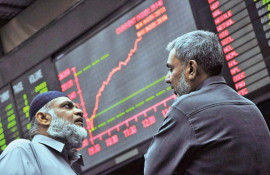
As an economist, I have to make a confession. I disagree with many mainstream economists on their opinion that prices should be controlled, a policy governments all over the world tend to employ when devising monetary policy. Although inflation and unemployment are two main targets of economic policy, prices should not be controlled except when they are artificially increased by a monopoly or a cartel.
Why should the prices be not regulated? In a competitive environment, where demand and supply forces predominantly influence price movements, any attempts to keep the prices down artificially results in a dilution of quality and in some cases quantity (which effectively means no real change in price).
We can see the quality of supplied goods and services deteriorating when prices are either kept artificially low or when demand is highly price elastic. For example, a cup of tea in Pakistan has gone down in quality and has shrunk in size because its price has been influenced by regulation and, indirectly, by social pressure. Another example – and there are many- attempts to regulate the meat prices have resulted in lower quality products. Similarly, a cap on the price of roti results in a decrease in its size.
While a negative relationship between prices and demand has been studied and is well documented in economic literature, the impact of higher prices (inflation) on the quality of goods and services is relatively ignored by economists. In Pakistan, inflation has killed quality, because demand has in general been price elastic. The cottage industries and handicrafts are real casualties of inflation. Rug manufacturing in Gakkhar Mandi, traditional shawl weaving in Khairpur, and carpets industry have suffered due to the loss of quality resulting from inflation. Take the example of rugs produced in Gakkhar Mandi. The town used to produce very high quality rugs, which were not only used throughout the country but were also exported. The producers found out that the demand for rugs was highly price elastic. As they were not able to increase their prices (despite increase in their own costs and the prices of inputs like cotton), they gradually started decreasing the weights of their products. Hence, a rug, which used to be 25 kilogrammes in weight 25-30 years ago, is only five kilogrammes in weight today. This was achieved by weaving the rugs loose, as compred to previously tightly knitted weaving. This has resulted in a huge drop in quality. Gone are the days of rich, flocculent textures of rugs and the intricate artistry of shawls, replaced by substandard material.
Furthermore, erosion of the real income decreased demand for high quality ostentational products produced in the country, which compelled the master workers in traditional industries to migrate to other professions. One exception perhaps is the furniture industry, which appears to be less price elastic and more income elastic. Consequently, with the increase in income levels of the middle and upper middle classes, demand for high quality furniture has increased in the country.
The government has failed to induce the creation of international brands out of the traditional capacity in indigenous agriculture and industry. This is contrary to other countries like Indonesia, Malaysia and other Far Eastern countries, where governments have helped the local manufacturers in developing quality brands. Malaysia provides an excellent example of moving away from producing counterfeit products to establishing local brands like Padini.
On a policy level, inflation targetting has never worked in Pakistan and, given the state of the economy, will never work as the transmission mechanism doesn’t respond to monetary or fiscal policies. In Pakistan, monetary discipline, fiscal prudence, exchange rate stability and energy management should be the policy targets. Otherwise, the country will not only lose quality in products but also experience a drop in quality of human capital, which is already evident from the brain drainage the country has experienced for decades.
The writer is an economist and PhD from Cambridge University
Published in The Express Tribune, January 30th, 2012
COMMENTS (6)
Comments are moderated and generally will be posted if they are on-topic and not abusive.
For more information, please see our Comments FAQ



1732259077-0/carti-(1)1732259077-0-165x106.webp)













In a short space you have conveyed an important message in a very beautiful manner.
Yes your right ...Also is this a world-wide phenomenon too ? tamkin riaz london
Even branded products have suffered from a reduction in quality. This is quite apparent when you compare the quality of a packet of locally produced instant noodles sold under a multinational company's brand and a packet of imported noodles sold under an Indonesian brand. The Indonesian product is much better in quality and quantity albeit a few rupees more expensive.
Other products that come to mind are biscuit packets that have shrunk over the years while their prices have gone up. Meanwhile the branding remains. Demand must be very price elastic in Pakistan.
Dear Humayun, I wonder why you haven't mentioned a very important aspect of price regulation. I agree prices should not be controlled by the government at all. But, to let them roam free, we need to have tight regulatory policies regarding hoarding and/or other malpractices that lead to structured supply crises. If you tend to deregulate prices without implementing these policies, the result will be even more disastrous.
Inflation targeting has NEVER been practiced in Pakistan. Setting an annual inflation target is not inflation targeting in the technical sense of the word. Google the phrase.
The transmission mechanism works -- with a lag of 12-15 months according to SBP data/studies.
To say we should let prices rise (to improve quality) after inflation has ravaged the people for the past four years is callous and reveals a disconnect from reality that is scary.
Are low-inflation countries around the world sacrificing "quality"? In the US the headline inflation rate is about 0.6%. Are people suffering from low quality or from a lack of jobs?!
So when we admit that we have no products, 70% of them are counterfeit, no local manufacturing left specially after the devastating FTA with China that killed our industries, and on top very poor quality of products, why do we go begging around the world asking for concessions and unilateral trade benefits??? Dont we or our leaders have any shame?